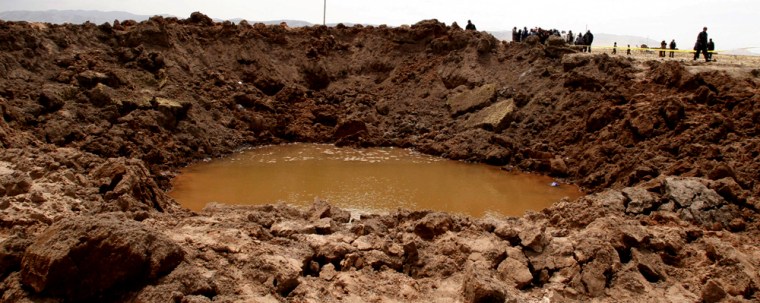A fiery meteorite crashed into southern Peru over the weekend, experts confirmed on Wednesday. But they were still puzzling over claims that it gave off fumes that sickened 200 people.
Witnesses told reporters that a fiery ball fell from the sky and smashed into the desolate Andean plain near the Bolivian border Saturday morning.
Jose Mechare, a scientist with Peru's Geological, Mining and Metallurgical Institute, said a geologist had confirmed that it was a "rocky meteorite," based on the fragments analyzed.
He said water in the meteorite's muddy crater boiled for maybe 10 minutes from the heat and could have given off a vapor that sickened people, and scientists were taking water samples.
"We are not completely certain that there was no contamination," Mechare said.
Jorge Lopez, director of the health department in the state where the meteorite crashed, told The Associated Press on Tuesday that 200 people suffered headaches, nausea and respiratory problems caused by "toxic" fumes emanating from the crater, which is some 65 feet wide and 15 feet deep.
But a team of doctors sent to the isolated site, 3 1/2 hours travel from the state capital of Puno, said they found no evidence the meteorite had sickened people, the Lima newspaper El Comercio reported Wednesday.
Modesto Montoya, a member of the team, was quoted as saying doctors also had found no sign of radioactive contamination among families living nearby, but had taken blood samples from 19 people to be sure.
He said fear may have provoked psychosomatic ailments.
"When a meteorite falls, it produces horrid sounds when it makes contact with the atmosphere," he told the paper. "It is as if a giant rock is being sanded. Those sounds could have frightened them."
Justina Limache, 74, told El Comercio that when she heard the thunderous roar from the sky, she abandoned her flock of alpacas and ran to her small home with her 8-year-old granddaughter. She said that after the meteorite struck, small rocks rained down on the roof of her house for several minutes and she feared the house was going to collapse.
Meteor expert Ursula Marvin said that if people were sickened, "it wouldn't be the meteorite itself, but the dust it raises."
A meteorite "wouldn't get much gas out of the Earth," said Marvin, who has studied the objects since 1961 at the Smithsonian Astrophysical Observatory in Cambridge, Mass. "It's a very superficial thing.
